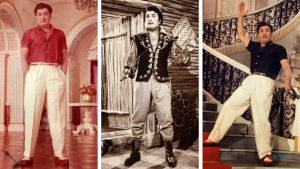REVIEW: ‘Sardar’ – A gripping spy thriller with solid subject matter and a few irksome commercial clichés.
It is encouraging to witness a story in Indian cinema about a hero protecting the nation from a grave threat involving international politics, and it is even more unusual to see one that does so in a way that is believable. The commercialisation of water into corporates is already taking root in and around my city, so I was at least able to relate to the theme of the movie Sardar, which is currently in high demand. Aside from a lot of preaching delivered through explanation dialogue, the story’s core successfully engages the audience.

In order to protect the country from the water mafia, the plot involves the most dangerous spy in the world against the backdrop of RAW intelligence. The spy-themed screenplay is dated, yet it manages to keep us engaged with a few original concepts. The screenplay is the best part of the movie since it had the perfect pacing and build-ups to prepare the audience for the major events that are to come. The events that culminated in Sardar’s introduction were moving along perfectly.
Although Karthi’s portrayal of Viay Prakash at first seemed strange and somewhat reminiscent of his “Siruthai,” it was later shown to be well justified and made more sense. With his prior experience, Vijay Prakash was a piece of cake for the actor, but Karthi’s role as Sardar was the difficult one, and for the first time, he excels as a 50-year-old man. Whether it was Rajisha Vijayan or Raashi Khanna, the female lead characters had more to the plot than simply being the better half of the protagonist. Laila returned to the screen and played a crucial part, continuing the trend of young mothers who sacrifice their lives for societal causes. Although Master Rithvik’s portrayal of Timothy is intriguing, I thought the character’s maturity and contribution were overstated. I’m not a fan of villains who are purposefully depicted as bad in all ways, especially through language, and Chunky Pandey is one of them.

The film’s two mainstays are unquestionably Dilip Subbarayan’s stunts and the score by GV. Every scene is improved by the BGM, but it works especially well for the action-packed scenes and the expertly staged stunt sequences. Even if the stunts were powerful, they were occasionally a little too unbelievable to be believed, and there are limits to how many times we can shield the heroes from gunfire. I wish that the sentiments Sardar experienced with his family remained the same because they were so effective in enhancing a spy’s character. There are tunes and thoughts that can start to upset you but go away fast since they are brief.
It’s okay that we comprehend the scenario and that it’s normal when the protagonist’s family has passed away. The turns you give it now are no longer shocking, and it is felt that they have no effect. Nothing could be more terrible for a villain than to force that character with more when he wants to subjugate the entire country. Sardar has a really unique storyline that will have you on the edge of your seat and includes some profound social issues in addition to some annoying clichés. And hey, if James Bonds can do it Indian spies can do it too!!
Author Profile
-
Talk to me about your favourites and know the Unnoticed.
This is Madhan Ranganathan (a) Felix Kingsley - Behind the Mirrors
Latest Articles
 Reviews2023.02.08Michael – One of the most cooked recipes, ends up flavourless
Reviews2023.02.08Michael – One of the most cooked recipes, ends up flavourless Reviews2022.12.25REVIEW: Connect – Successful in recreating the “Hollywood” horror but lacks content
Reviews2022.12.25REVIEW: Connect – Successful in recreating the “Hollywood” horror but lacks content Reviews2022.12.25REVIEW: Laththi – A refreshing storyline falling prey to the usual mass hero’s heroics
Reviews2022.12.25REVIEW: Laththi – A refreshing storyline falling prey to the usual mass hero’s heroics Reviews2022.12.13REVIEW: Varalaru Mukkiyam – A plot in the name of ‘Just for fun’ is loosely written and executed
Reviews2022.12.13REVIEW: Varalaru Mukkiyam – A plot in the name of ‘Just for fun’ is loosely written and executed















